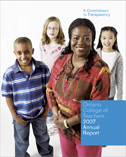|
|
2007 Annual Report highlightsA commitment to transparency
Transparency and accountability are reflected in a number of initiatives, including an examination of the College’s policies on the availability of discipline decisions from public hearings and a review of College registration practices. The review on the availability of discipline decisions led to a more effective procedural framework for complying with our obligation to provide public access to Discipline Committee panel decisions following public disciplinary hearings. The College recommended to the Minister of Education that the wording of the Professional Misconduct Regulation be amended to separate the forms of abuse that are currently listed together in the regulation. This change offers transparency to the public as well as clarity to members. It will help end confusion about the number of members who face sexual misconduct allegations. The College wanted to ensure that its licensing process was transparent, objective, impartial and fair to internationally educated applicants and others. Among a range of issues, the College looked at the amount and clarity of information we provide to applicants, the length of time it takes to become certified, how qualifications are assessed, fees, reasons for denying certification, the appeal process, training and records access. The College also developed and approved rules of procedure for registration appeals hearings, and administrative guidelines for in-person presentations to the Registration Appeals Committee. These new rules will clarify procedures for the committee and provide clear guidance for appellants who wish to have a hearing or make a presentation in support of their appeal. Ongoing professional learningThe new Additional Qualification (AQ) courses that will be available for members in the fall of 2008 are the most immediate benefit that teachers across the province are going to see from the Teachers’ Qualifications Review concluded in 2006. This year, the College moved forward in implementing plans for projects related to the review. During the review, teachers said it was time to offer more up-to-date subjects in the AQ catalogue. The College listened, and results can be seen in new AQs like mentoring, American Sign Language, the use and knowledge of assistive technology, outdoor experiential education and teaching, and learning through e-learning. The College also heard that the profession needs to provide courses and recognize qualifications that broaden the scope of teachers’ existing expertise. This is reflected in AQs on topics like education law, understanding the history and current issues related to First Nations, Inuit and Métis peoples, adapting curriculum for the Catholic school system, adapting curriculum for second-language learners and teaching combined grades. Job prospectsThe College’s 2007 Transition to Teaching study indicates that job opportunities for new teachers who can teach in French remain plentiful in both French-language and English-language schools in all areas of the province. But the province’s English-language teacher employment market is highly competitive. New teachers compete for jobs with large numbers of surplus teachers, many of whom are still hoping to move from occasional to regular teaching jobs one, two or even three years after graduation. Competition for longer-term occasional assignments is especially challenging. Internationally educated teachers newly certified in Ontario said that securing a full-time job presents more of a challenge for them than it does for their Ontario-educated counterparts. Teachers educated overseas don’t have the contacts and system knowledge that Ontario BEd graduates do, and the College’s research shows this places them at a disadvantage when they look for work. Financial highlights The College recorded a lower than anticipated deficit of $618,000 due to higher than budgeted revenues. Although there was no change to the annual membership fee or applicant fee, revenues were higher than expected because the College had more members and more applicants in 2007. Strong advertising income from Professionally Speaking – reaching the $1.1 million mark in 2007 – and better returns on funds invested than in 2006 also contributed to the higher revenue levels. The College is financed primarily by members’ fees. In 2007, 213,417 members paid annual fees as the profession continued to welcome new teachers. The higher than forecast membership brought in $364,000 more than budgeted. The number of members in good standing as of December 31, 2007 was 212,739. Council approved the Finance Committee’s recommendation that the 2007 operating deficit of $618,000 be financed from the Reserve for Fee Stabilization within the Members’ Equity reserve accounts. Consolidated statement of operationsOntario College of Teachers
|










 The College made
The College made